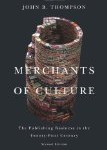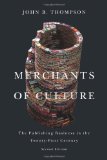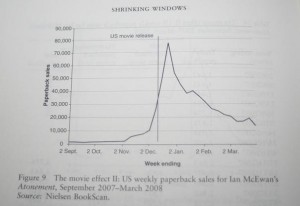Five words from the blurb: publishing, world, marketing, books, money
Merchants of Culture provides detailed information about the publishing industry in Great Britain and America. By interviewing professionals and studying sales statistics John Thompson provides a comprehensive analysis of the changes in the industry over the last hundred years.
This book isn’t an easy read – it is a text book packed with technical information and detailed statistical analysis. Some sections fascinated me, but others were explained in far too much depth for the casual reader.
Before I began blogging I knew nothing about the publishing industry, but over the years I’ve come to realise what a complex, high risk business it is. This book explains every aspect of the industry: from the way agents and scouts discover authors, and the types of deals they secure; right through to the changing way books are sold in book shops and on the Internet.
The publishing industry works in a very different way to other retail sectors and I was surprised by some of the statistics:
…for every 100 new hardcovers shipped out, somewhere between 30 and 60 will come back to the publisher as returns.
I also found the impact of film releases and TV appearances surprisingly large:
The only problem with this book is that it is going out of date fast. It was only published in 2010, but I already found that much of the information on digital publishing was out-of-date.
I think this book is a must read for anyone who works in the publishing industry and authors could also benefit from learning more about rights and marketing issues before they sign a contract with a publisher. Anyone else with an interest in the publishing industry will find a lot of interesting facts, but be aware that you may have to wade through a lot of technical detail to find it.

.
Many thanks to Litlove for drawing this book to my attention.



10 replies on “Merchants of Culture by John Thompson”
I have an interest, obviously like most of us, but I’m not sure to this extent. I have a very short attention span these days. Ha!
Sandy, You need a good concentration span to make it through this one so I advise avoiding this one until you have more time. It is fascinating stuff if you can concentrate on all the details.
That certainly sounds like an informative read. Living with an author, and being related to several more, I’m constantly amazed by what goes on in the industry…this sounds like a book I need to check out and possibly pass the recommendation on.
Jordan, Thank you for commenting on my blog for the first time! I suspect your author family + friends will thank you for sharing some of the details in this book with them. There really is a massive amount that can be learnt about the industry.
Wow … that stat is eye-popping. I’m sure there are some interesting facts in there that most readers would be interested in.
Jenners, Yes – there are loads of great facts and statistics and I loved learning about the way the industry worked. I’m sure you’d find a lot to enjoy.
I’m glad you liked it enough to give it four stars! I completely agree – it is very technical in places, and in the urge to be entirely accurate and comprehensive in its account of the industry, it does give more information than our brains can handle! But some of the chapters – like the one on ‘Big Books’ – were quite fascinating, and I was really intrigued by the insight into the way agents and editors work together (or not, as the case may be) when it comes to auctions and so on. The term ‘web of collective belief’ has also stuck with me, reminding me how risky and precarious most publishing decisions are.
litlove,
“it does give more information than our brains can handle!”
Exactly! It is probably a book that is meant to be dipped into and it is madness to attempt to read it from cover to cover, but I am glad I did so. The web of collective belief was an interesting idea, but it is a shame that the voice of one person can’t be trusted. We can’t all agree on what is a good book and so I sometimes wonder if there is too much compromise. But it was interesting to learn how similar publishing and gambling are!
I’m not sure I’d want to commit to it since it’s a textbook, but I would be interested to see how publishing has changed in the years since I’ve been staying at home with my boys. I used to work in sales at a publishing company, and I loved the job. I left in 2001 though, so I would imagine that much is different from how it used to be.
Alyce, You might not want to read it all, but I think you might find it interesting to read individual chapters. It is amazing how fast things are changing at the moment.